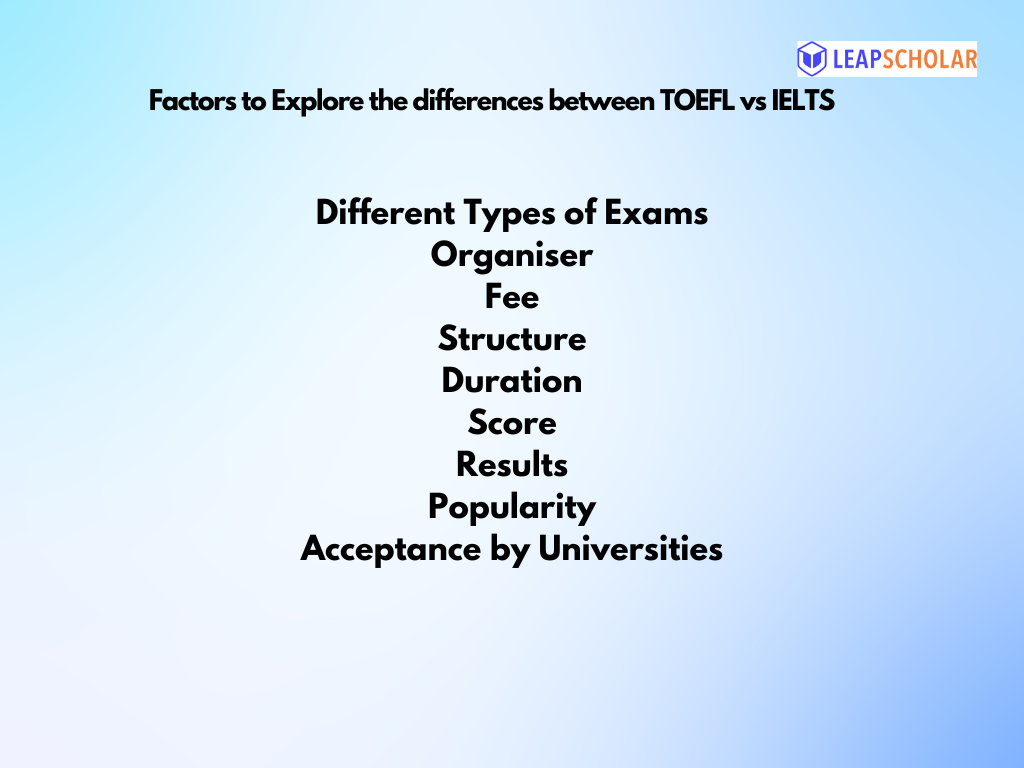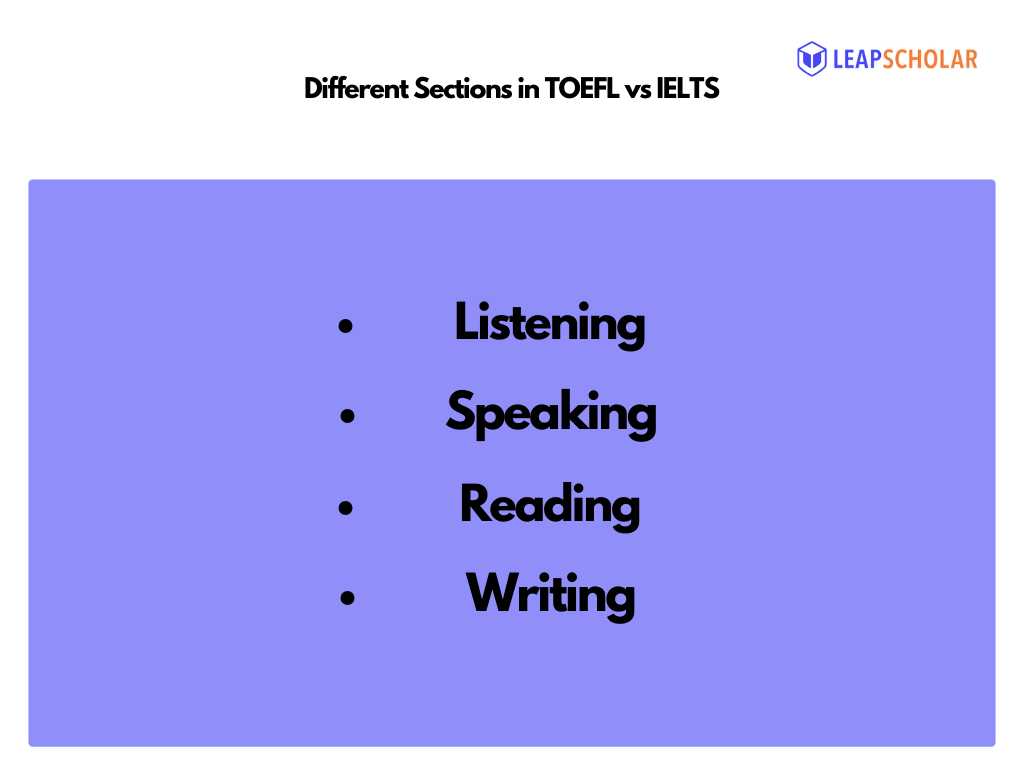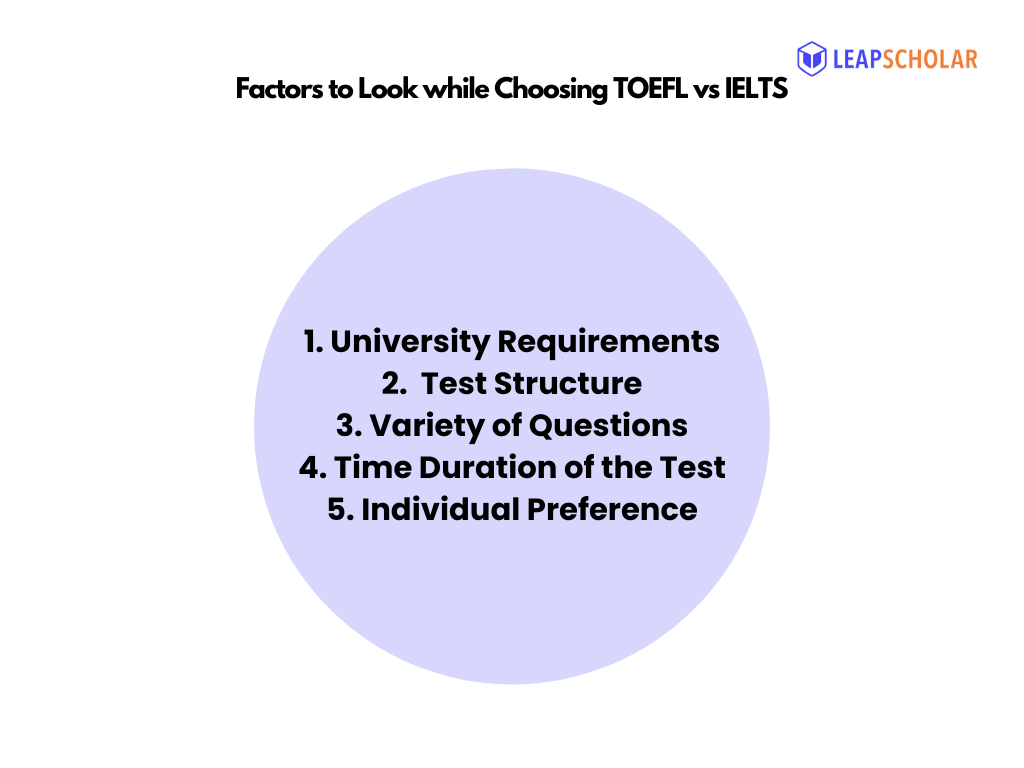English proficiency test scores play a crucial role in university applications, especially those aspiring to study in English-speaking countries.
All individuals who are not native English speakers must take these exams as part of their application process.

Consult IELTS Expert for a Free Personalised Learning Plan
Improve your IELTS speaking score with a 1:1 consultation.
The two most widely recognised tests are TOEFL vs IELTS, which evaluate candidates’ reading, writing, listening, and speaking abilities in distinct formats.
If you are uncertain whether to choose TOEFL vs IELTS, an informative blog comparing the two exams has been created to assist you in making an informed decision.
IELTS and TOEFL Difference
Let’s explore the differences between TOEFL vs IELTS.

- IELTS
- International English Language Testing System is a recognised language proficiency test taken by individuals aiming for overseas education or professional reasons.
- It holds credibility in 140 countries globally. IELTS offers two versions: IELTS General Training, designed for working professionals and immigration purposes, and IELTS Academic, tailored for those pursuing education.
- TOEFL
- In contrast, the Test of English Language as a Foreign Language is another renowned language proficiency test commonly chosen by students aspiring to study abroad.
- This test evaluates applicants’ abilities to communicate effectively in a classroom setting, and it is acknowledged in approximately 130 countries worldwide.
The table below depicts the difference between TOEFL vs IELTS.
| Features | IELTS | TOEFL |
| Different Types of Exams | Academic General Training | TOEFL iBT (TOEFL Internet-based Test) TOEFL Test on Paper |
| Organiser | IELTS IDP India | Educational Testing Service (ETS) |
| Fee | INR 16,250 | INR 16,900 |
| Structure | Reading, Writing, Speaking, Listening | Reading, Writing, Speaking, Listening |
| Duration | 2 hours 45 minutes | 1 hr 56 minutes |
| Score | 1 to 9 | 0 to 120 |
| Results after the test date | 3 to 5 days | 6 to 10 days |
| Popularity | Popular in Canada, the UK, and Australia | Popular in the USA and Canada |
| Acceptance | 11000+ International Colleges | 11500+ International Colleges |
Note:
- TOEFL and IELTS academic tests are more challenging than the general test.
- You will need the TOEFL or IELTS academic scores if you’re aiming for admission into a degree program beyond the secondary level.
- Scores are valid for only two years, regardless of your chosen test.
TOEFL vs IELTS: Test Format
When comparing the formats of TOEFL and IELTS, some key differences become evident.

IELTS offers a more real-world experience than TOEFL, and the ease or difficulty may depend on your English background.

Want to Score 7+ IELTS Band in 4 Weeks?
5L+ students across India have signed up for Leap’s Masterclass to date.

Want to Score 7+ IELTS Band in 4 Weeks?
5L+ students across India have signed up for Leap’s Masterclass to date.
TOEFL Test Format
Let’s explore the TOEFL test format with the help of the table given below.
| Name of the Section | Number of Tasks | Duration |
| Reading | 20 | 35 |
| Listening | 28 | 36 |
| Speaking | 4 | 16 |
| Writing | 2 | 29 |
IELTS Test Format
Let’s explore the IELTS test format with the help of the table given below.
| Name of the Section | Number of Tasks | Duration (in minutes) |
| Reading | 3 | 60 |
| Listening | 4 | 30 |
| Speaking | 3 | 11 to 15 |
| Writing | 2 | 60 |
TOEFL vs IELTS: Reading Section
Let’s understand the difference between the reading section of TOEFL vs IELTS.
- In the IELTS Academic test, you’ll encounter three reading passages covering various topics, up to 2,150-2,750 words. These topics are sourced from books, magazines, newspapers, journals, or websites.
- On the other hand, the TOEFL test provides only two reading passages, each around 700 words. Importantly, you don’t have to be an expert to answer questions.
- IELTS and TOEFL expect you to determine answers based on their understanding of the passages. So, it’s more about comprehending the information than being a specialist in the topics presented.
TOEFL vs IELTS: Listening Section
Let’s delve into the differences between the listening section of TOEFL vs IELTS.
IELTS Listening Section:
- In the IELTS Listening section, there are four parts, and each part has 10 questions.
- The initial two sections focus on everyday life and social situations, while the latter are more academic.
- Sections 1 and 3 include multiple speakers, providing a varied listening experience, while sections 2 and 4 feature monologues.
TOEFL Listening Section:
- In TOEFL listening, the structure involves five parts, incorporating conversations and lectures in a language applicable to studying abroad.
- Within this format are three lectures, each followed by six questions and two conversations involving two speakers, adding diversity to the listening tasks.
TOEFL vs IELTS: Speaking Section
Let’s learn more about the differences between the speaking section of TOEFL vs IELTS. The critical contrast between the speaking sections of TOEFL and IELTS lies in how they are conducted.
- In the IELTS speaking section, you engage in a face-to-face conversation or a video call with an IELTS examiner.
- On the other hand, TOEFL’s speaking section involves responding to questions through a microphone, relying on listening skills. It makes TOEFL’s speaking section a blend of listening and speaking tasks.
- Additionally, IELTS speaking responses are evaluated by human examiners, whereas TOEFL employs a combination of artificial intelligence (AI) and human evaluators for its speaking section assessment.
TOEFL vs IELTS: Writing Section
Let’s learn more about the differences between the TOEFL writing section and IELTS. Both IELTS and TOEFL encompass two writing tasks, each with distinct formats.
IELTS Writing Section:
- In IELTS Writing Task 1, candidates are presented with information in a graph, chart, table, or diagram. They are required to write a minimum of 150 words within a time frame of 20 minutes.
- For IELTS Writing Task 2, candidates must compose a response of at least 250 words addressing an argument, problem, or point of view. This task allows 40 minutes for completion.
TOEFL Writing Section:
- Regarding TOEFL, Task 1 involves an integrated listening, reading, and writing assignment. Candidates listen to a short lecture, read a brief passage, and then craft a response based on the information presented.
- Moving to TOEFL Task 2 entails essay writing to support an opinion within an online classroom discussion. This task assesses the ability to express ideas coherently and cohesively in a written form.
TOEFL vs IELTS: Score Comparison
IELTS scores range from 1 to 9; your overall score is the average of individual scores in all four sections. If, for instance, your average is 6.25, it is rounded up to a final score of 6.5. In comparison, TOEFL is a test with a maximum score of 120 points.
A rough comparison between TOEFL and IELTS total scores can be made as follows:
| TOEFL Band Score | IELTS Band Score |
| 118-120 | 9 |
| 115-117 | 8.5 |
| 110-114 | 8 |
| 102-109 | 7.5 |
| 94-101 | 7 |
| 79-93 | 6.5 |
| 60-78 | 6 |
| 46-59 | 5.5 |
| 35-45 | 5 |
| 32-34 | 4.5 |
| 0-31 | 0-4 |
TOEFL or IELTS for Indian Students: Which is Easier?
If you’re trying to decide which English proficiency test to take, here are some helpful points to consider:

1. University Requirement:
- Over 10,000 universities recognise TOEFL-IBT in more than 150 countries, including Australia, Canada, New Zealand, the UK, the USA, the EU, and Asia.
- IELTS is accepted by educational institutions in Australia, the UK, Canada, and over 3,000 academic institutions in the USA.
2. Test Structure:
- TOEFL’s computer-based version is more popular, while IELTS introduced its computer-based version in 2018.
- Both tests consist of four sections: Listening, Reading, Writing, and Speaking. TOEFL is more academically oriented, resembling university textbooks, while IELTS is more real-life context-based.
3. Variety of Questions:
- TOEFL mostly has multiple-choice questions, including rearranging options to find the correct answer.
- IELTS often requires writing your answers. If you’re more comfortable with MCQs, TOEFL might be better.
4. Time Duration of the Test:
- IELTS has a total testing time of 2 hours and 55 minutes, while TOEFL is a longer exam lasting up to 4 hours and 20 minutes.
- IELTS may be a more suitable choice if you prefer shorter testing durations.
5. Individual Preference:
- TOEFL’s Speaking section involves talking to a computer, evaluated by certified assessors. IELTS, in contrast, includes a face-to-face interview with an examiner.
- The choice between the two often comes down to personal preference.
To Sum Up
In conclusion, determining whether TOEFL vs IELTS is easier depends on individual preferences and strengths.
Both tests assess English language proficiency but have distinct formats. Some may find TOEFL’s computerised format more comfortable, while others may prefer IELTS’ face-to-face speaking component.
Test-takers need to understand their strengths and choose accordingly.
Leap Scholar Counselling stands ready to assist with personalised guidance in making such decisions.
Their expertise ensures students receive the support needed to navigate language proficiency exams and pursue their academic goals effectively.
Frequently Asked Questions
-
Q. What is the International English Language Testing System (IELTS) exam, and why is it so important?
A. The International English Language Testing System, sometimes known as the IELTS exam, was designed to evaluate your level of competency in the English language. It is essential for individuals who wish to study, work, or relocate to nations where English is the primary language.
-
Q. What is the structure of the IELTS examination?
A. Listening, reading, writing, and speaking are the four components of the IELTS examination. Evaluations of various language skills are included in each segment. The sections on listening and speaking are identical for both the Academic and General Training test types. However, the sections on reading and writing are different for each edition.
-
Q. What are the two types of IELTS examinations?
A. The Academic version is intended for individuals applying to learn at the university level, whilst the General Training version is designed for individuals seeking employment or immigration. Although the Listening and Speaking sections are the same in both editions, the Reading and Writing problems differ in each version.
-
Q. The fourth question is: how is the IELTS exam judged, and what is considered a good score?
A. The IELTS exam uses a scale that ranges from 0 to 9 bands to determine a score. The lowest possible band score is one, and the most excellent possible score is nine. The prerequisites for a good score vary from person to person, but according to most universities and immigration programmes, a score between 6.5 and 7.5 is typically required.
-
Q. How can I prepare for the International English Language Testing System (IELTS) exam?
A. Preparedness is becoming familiar with the examination format, practising each component, and developing your ability to manage your time effectively. Use the official IELTS practice materials, participate in mock examinations, and consider enrolling in preparatory courses for added direction.
-
Q. What is the validity period for the IELTS results, and how can I send them to the institutions I want to attend?
A. The validity of IELTS results typically lasts for two years. You can request additional score reports during registration or after receiving your results. These reports can be sent to the universities or educational institutions. Investigating the scoring requirements and procedures of various educational institutions is highly recommended.
-
Q. What is the Test of English as a Foreign Language (TOEFL)?
A. The Test of English as a Foreign Language, also known as the TOEFL exam, is a standardised test meant to evaluate the English language ability of individuals who are not native speakers. Reading, listening, speaking, and writing are assessed as part of this process.
-
Q. What is the format of the questions on the TOEFL exam?
A. TOEFL consists of four sections: Read, Listen, Speak, and Write. The linguistic abilities that are evaluated in each segment are distinct. The test is administered using a format that is based on computers. The total time duration of the TOEFL exam is 1 hour and 56 minutes.
-
Q. What is the average time required to finish the TOEFL exam?
A. The TOEFL exam usually takes approximately four hours to finish. During each segment of the examination, there is an absolute necessity for test takers to manage their time effectively—practice time management during your preparation and the actual exam. You can also set a timer for each practice session to simulate test conditions.
-
Q. How is the Speaking component of the TOEFL administered?
A. Test takers react to tasks by speaking into a microphone in the TOEFL Speaking section. It evaluates their capacity to articulate their thoughts and ideas in English. Regularly take full-length TOEFL practice tests to assess your progress. Analyse your mistakes and focus on improving weak areas. Simulating test conditions will also help reduce anxiety on exam day.
-
Q. If I am not happy with my result on the TOEFL exam, can I retake the test?
A. You are permitted to retake the TOEFL exam an unlimited number of times; however, there must be a minimum of twelve days between each try. Your most outstanding score is taken into consideration by educational institutions. Expand your English vocabulary by reading widely and using new words in sentences.
-
Q. What is a decent score on the TOEFL exam, and how is the score determined?
A. The total number of points that can be earned on the TOEFL exam ranges from 0 to 120. Generally, a score higher than 90 is considered vital; nevertheless, the institution’s requirements to which you apply will determine what constitutes a good score. When applying to schools you are interested in attending, you must check the required precise score requirements.

















Have Questions? Get Guidance to reach your Dream University
Connect with India's finest counsellors and biggest study abroad community.